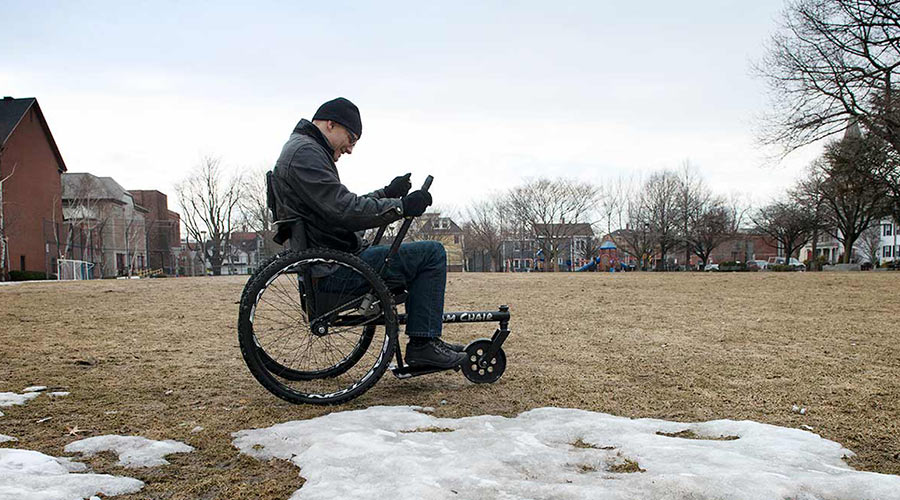Inventors. And necessity. Necessity being the mother of invention. That’s what I thought when I received an email from an advertising agency in Boston, one conducting research for a start-up that developed an all-terrain recreational device and was founded by engineers at MIT. “The mountain bike for wheelchairs.” I did a quick search. It all sounded legit. More than legit, it holds promise. This Freedom Chair could get me out into nature, something I’ve been aching to do.
Said the researcher, “I stumbled upon a quote from you about moving from Boston to Seattle, which caught my eye since I’m actually born and raised in Seattle!” Nice connect. She continued, “As an advocate and consultant for people with disabilities, your passion really inspires us. My team and I would love to interview you to learn more about some of the barriers (particularly attitudinal and systemic) in our society.” Would I be available to chat? Why, yes. Yes, indeed.
I learned and listened as much as I spoke. The Freedom Chair uses levers to capitalize on the body’s torque. It is stabilized by a tripod frame and built from bike parts. Another strong connection, as Back Alley Bike Repair here in Seattle is my favorite wheelchair fix-it shop. I shared some suggestions about ways to engage the disability community, including disability-related organizations at universities and colleges. I felt heard. I wanted to know more. I wanted to do a test drive during my next journey out to visit my Boston-area family.
It was a cold spring day in New England. My father and I arrived at a park near the offices of Global Research Innovation and Technology in Cambridge. GRIT: http://gogrit.org. Ben, one of the MIT engineers, explained how the chair works. My father, AKA Mr. Gadget, had a million questions. With minimal help, I got into the chair and was off, so to speak. Award-winning photojournalist and good friend David Binder was able to join us and capture the event. True confession: I was tired. Bone tired. I had been fighting a cold. The cold was definitely winning. But when was I going to get this chance again? So drag myself out, I did. Wasn’t the first time; won’t be the last.
You use two vertical poles to propel the chair rather than pushing on the wheels. It was a completely different motion than I was used to making. My father watched, shouting encouragement and a few instructions. I felt, a little, like a young athlete charging up the field while a proud parent looked on, gaining confidence as I gained traction. The ice-covered field felt familiar, too. I remember the morning rituals of my boyhood. My father up early to make sure I have ice-time. The kitchen steaming with hot coffee and oatmeal. Our quiet ride to the rink in a cold car. That’s how my father loves me. How he still loves me. Peppering would-be coaches with questions. Observing me with steady eyes. Standing in the cold while his son practices.


Randy is:
1. A remarkable writer.
2. A good friend.
3. An athlete.
4. An inspiration.
Hello Randy,
Another blogger sent me the link to your blog. I am interested in the Freedom Chair and have e-mailed Mario at Grit a series of questions. I was wondering whether you had any further observations about this chair that you would be willing to share with me off-blog. My email is ecarter09@gmail.com.Thanks for writing about this.
Randy, you fill the seat of the “Freedom Chair” to a ‘T’. You are smart, funny, personable, educated, humanistic and uncomplaining. You write like a poet.
Although you have lost the use of your legs, your doggedness, athleticism and determination carry you along and make being with you a joy. Your knowledge of baseball, basketball, lacrosse, football (and sometimes hockey) is encyclopaedic, especially when Boston or the Seattle teams are playing.
With you, compassion, fair play and knowledge pave the way as you progress along the Freedom Trail. I love you.
Sterling Haynes MD [alias Doctor X]
Your grateful father-in-law.
Beautiful! I so so feel for you wanting to get into nature. What a wonderful boon!